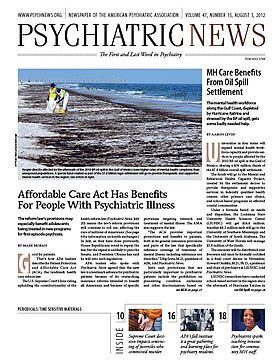Psychiatrists should play a key role in determining the appropriate supervision levels for hospital outpatient therapy services, particularly those provided to individuals with mental illness.
This is one of APA’s key recommendations in comments submitted to the Centers for Medicare and Medicaid Services (CMS) and the Advisory Panel on Ambulatory Payment Classification Groups (APC Panel), which are tasked with recommending the degree of supervision necessary to ensure the delivery of safe and effective services.
“APA members are the only physicians who specialize in mental health services; this makes them uniquely equipped with the clinical expertise to accurately assess the complexity, or lack thereof, of the clinical work that goes into delivering each therapeutic service under the APC Panel’s review,” wrote APA Medical Director James H. Scully Jr., M.D.
CMS established the APC Panel in November 2000, following publication earlier that year of a final rule implementing a new hospital outpatient prospective payment system (OPPS). Since that time, CMS has published rules annually to implement statutory requirements and changes arising from the agency’s experience with the OPPS.
In a 463-page final rule published November 30, 2011, CMS charged the APC Panel with recommending one of the following two supervision levels applicable to therapeutic interventions provided at hospitals on an outpatient basis:
General supervision. The therapeutic service is furnished under the overall direction and control of a physician or appropriate nonphysician practitioner (NPP), but his or her physical presence is not required during performance of the service.
Direct supervision. The physician or NPP is immediately available to furnish assistance and direction throughout the performance of a therapeutic service or procedure, but he or she does not have to be present in the room where the service or procedure is being performed.
Following a meeting in February, the APC Panel recommended to CMS a change from direct to general supervision for 28 hospital outpatient therapeutic service codes, 20 of which relate to the delivery of individual, family, or group psychotherapy interventions.
On April 18, CMS asked for public comment on its preliminary decision to accept 27 of the APC Panel’s recommendations, including all of those pertaining to mental health care services.
In its letter to CMS and the APC Panel, APA took issue with the lack of transparency afforded by the agency’s subregulatory review process, noting that few clinician stakeholder groups were aware of the proposed changes and able to share their concerns.
“APA finds it inadequate that the one entity that did present at an APC Panel meeting on easing supervision standards was a hospital management organization with a proprietary interest in seeing CMS promulgate [the] rules,” Scully wrote. “While there is room for the presence of hospital billing personnel on the APC Panel, these persons are not clinicians and therefore lack the clinical education and clinical training to be able to make reasonable clinical judgments as to the appropriateness of easing a given code’s supervision standard.”
APA also questioned why the APC Panel has been tasked with reviewing outpatient therapy codes at all hospitals, instead of simply those at rural hospitals, where a shortage of clinicians may complicate the ability to deliver services under direct supervision.
Lastly, APA urged CMS to ensure that the APC Panel has an effective vetting and evaluation system in place for redressing any adverse health effects associated with the easing of supervision standards.
CMS acknowledged APA’s concerns in its final decision on the APC Panel’s recommendations on May 22, but did not make any adjustments to the proposed supervision levels for mental health services.
“We encourage the nomination and participation of clinicians on the panel who can best inform clinical issues regarding supervision levels,” wrote CMS.

